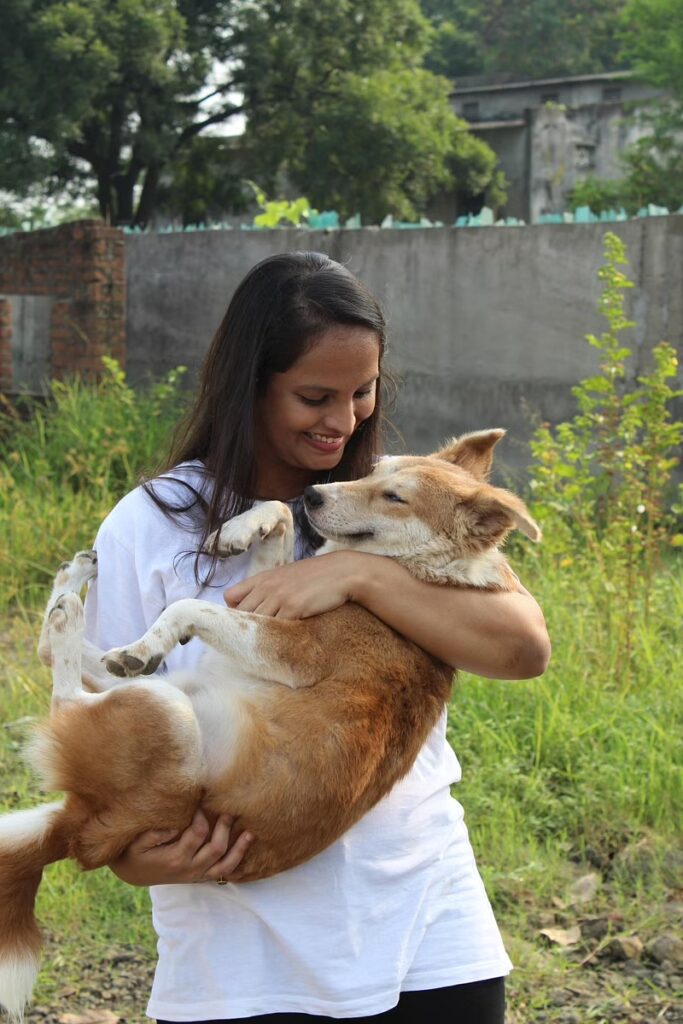Gargi Vairagare—a cynophile, paraglider, and entrepreneur—wants a compassionate and inclusive society for animals to live with dignity and safety.
Rise for Tails is a major part of that dream. The non-governmental organisation (NGO) serves stray animals with healthy food, shelter, and efficient medical services.
Gargi Vairagare Recalling how the NGO started, Gargi says, “The sight of the voiceless souls struggling on the streets pains me a lot. What triggered me to start this project was to rescue Lali. We got a call at 11 pm, asking for help for a dog lying on the street with bleeding eyes. And, we immediately rushed and picked her up.”

“On seeing her, we realised someone had purposely damaged her eyes. We took her to emergency surgery. Although it was too late to save her vision, we could save her life.”
Rise for Tails started with the question, “How do we ensure a decent life for these young voiceless souls on the streets?”
With an industrialist father, a mother working in the corporate sector, and a sister living in the US, Gargi followed an entirely different route, dedicating herself full-time to helping these needy animals.
Gargi believes that every life is precious, be it a human or the little voiceless animals on the streets.
Finding the cause
A decade ago, Gargi dropped out of engineering to pursue her dream through the NGO Rise. She facilitated the needs of people and animals by organising projects like ‘My Health’, which focused on building awareness for mental health and hygiene.
Under this project, Gargi installed vending machines and insulators in red light and slum areas across central India with the help of volunteers.
However, after the COVID-19 pandemic made it difficult to operate, Gargi decided to focus on animals and started a shelter in Nagpur called Rise For Tails.
At first, the initiative focused on feeding stray animals, covering about 3,000 dogs every day across Nagpur. Eventually, as the numbers rose, Rise for Tails turned into an animal rehabilitation centre.
The year-and-a-half-old shelter has a dedicated team of 10 people, including doctors, full-time veterinarians, supervisors, project managers, and caretakers. It also has a 24×7 veterinary mobile clinic on call and a facility of rescue vans.
Rise for Tails also has a sterilisation programme, where it has sterilised over 1,000 dogs and rescued and rehabilitated nearly 3,000 dogs, goats, cows, etc.
The centre also conducts weekly programmes like stray animal vaccinations, educating the masses on compassion towards animals, and more.
Saurabh, a centre supervisor at Rise for Tails, says, “My responsibility is to manage all the operations here. Every day, our entire staff goes through emotional ups and downs, keeping aside the other minor issues. However, we stand strong by the end of the day and are courageous enough to save and pet these beautiful animals. Our goal is bigger, and these fur babies have always been our motivation.” Powered by donations and fundraising from across India, the Nagpur-based NGO’s minimum monthly expenditure is nearly Rs 5-6 lakh.
Rise for Tails spends the capital on medicines, food, need-based health care, surgeries and salaries of in-house staff and building medical infrastructure.
Animal care
Although it predominately caters to dogs, Rise for Tails has rescued goats, cats, parrots, cows, and bulls. At present, it is home to over 50 dogs and a few cattle.
Rescuing stray animals struggling with disease, abandonment, abuse, and road rash; rehabilitation of rescued animals; animal birth control programmes; and vaccination are some of the NGO’s key operational areas.
“Since our inception, we have rescued and rehabilitated over 2,000 stray dogs, conducted over 1,000 animal birth control surgeries, and have rehabilitated a few hundred dogs,” Gargi tells SocialStory.
Running an NGO
Starting up amid the pandemic was one critical challenge for Gargi. In a small town like Nagpur, with under-developed facilities, animals were dying due to a lack of food, shelter, and rising COVID-19 cases.
Gargi explains, “One of the biggest challenges is the willingness among people to donate for such a cause, given the lack of awareness. Since most corporates are located in big cities, naturally, they are focused on NGOs in and around them, making it extremely difficult to attract corporate CSR funds. Moreover, getting volunteers for these cities is also a challenge.”
Additionally, the lack of awareness of animal welfare laws, quality of veterinary professionals, and support from the authorities add to the woes.
Going forward, Gargi wishes to build a sustainable model of animal welfare, conduct mass-scale ABC programmes and build a world-class veterinary centre. “We aim towards having a stray free society with a goal to reduce human-animal conflicts,” she concludes.



